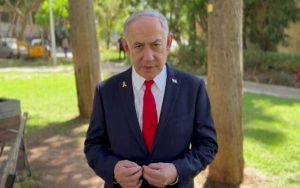
Israel’s Tel Aviv — Israel attacked the Defense Ministry headquarters and a neighborhood close to the presidential palace in Damascus, Syria, on Wednesday.
Israel’s military declared that it was stepping in to protect the Druze sect, a minority group in southern Syria whose settlement borders the Israeli-occupied Golan Heights. In the southern Syrian city of Sweida, Bedouin militias and Syrian government forces have engaged in combat with Druze armed organizations.
Israel’s attack of “government institutions and civilian infrastructures” in both Damascus and Sweida, which caused significant damage, was denounced “in the harshest terms” by Syria’s Foreign Ministry. Syria has the right to self-defense, it added.
The Israeli strikes in Damascus killed three people and wounded 34, according to the country’s Health Ministry.
Soon after the attack, Syria’s Interior Ministry and Druze leaders announced a renewed ceasefire agreement, but it was not immediately clear whether the violence would end.

Syria’s Defense Ministry blamed Druze militias in Sweida for violating a previous ceasefire that had been reached Tuesday, saying this caused Syrian government soldiers to return fire. The office of interim Syrian President Ahmed al-Sharaa published a statement assuring residents in Sweida that their “rights will always be protected and that we will not allow any party to tamper with their security or stability.”
The fighting comes at a delicate time. The United States has lifted most of its sanctions on Syria and has had warming relations with the Sharaa government. The U.S. has also worked on diplomatic efforts to improve ties between its close ally Israel and Syria.
The government is “extremely disturbed about the bloodshed in southern Syria,” according to U.S. Secretary of State Marco Rubio, who also stated that the administration is still in “continuous talks” with Syrian and Israeli authorities. Rubio posted on social media, saying, “We have decided on precise procedures that will bring this disturbing and horrifying situation to an end tonight.”
The administration wants to see “an Israeli withdrawal, a Syrian government withdrawal from the area as well,” according to State Department spokesman Tammy Bruce.
In southern Syria, hundreds are murdered.
The country’s new leaders have had difficulty establishing authority since autocratic Syrian President Bashar al-Assad was overthrown by Islamist militants last year. Attacks of sectarian retaliation by predominantly Sunni Muslim groups against minorities have been common in the nation, despite Sharaa’s repeated calls for peace. The Alawite religious minority, which includes the Assad family, has seen hundreds of its members killed.
The clashes in Sweida followed back-and-forth kidnappings and attacks between local Sunni Bedouin tribes and Druze armed factions that quickly flared into widespread clashes across villages and towns in the area, which saw neighborhoods shelled and homes set on fire. Syrian government forces that intervened to try to restore calm then clashed with the Druze. Amid communications blackouts to the area, many Druze people outside Sweida panicked about the fate of their families.
Hossam Kotroban, a 52-year-old English teacher, is a Druze resident in Sweida. He tells NPR his people are frustrated and distressed after suffering attacks from Bedouins and Syrian military forces.
“They came to kill us because we are Druze,” he says.
The Syrian Observatory for Human Rights, a conflict and rights monitor based in the United Kingdom, said 260 people had been killed in the area as of Wednesday morning, including four children, seven women and 138 Syrian soldiers and security forces.

During the fighting, Israel launched airstrikes targeting government troops and convoys. In Israel, men from the Druze community are conscripted into the military, with some occupying high ranks in the Israeli army.
On Wednesday, U.N. Secretary-General António Guterres condemned Israel’s strikes in Damascus, as well as in Sweida and the Syrian city of Daraa.
Turkey’s Foreign Ministry called Israel’s attacks “an act of sabotage against Syria’s efforts to secure peace, stability, and security.”
The United Arab Emirates, which normalized relations with Israel in 2020, said it “firmly denounced” the Israeli strikes in Syria.
Israeli Prime Minister Benjamin Netanyahu said in a statement Tuesday night that Israel has “a commitment to preserve the southwestern region of Syria as a demilitarized area on Israel’s border.” In remarks Wednesday, he said: “We are acting to save our Druze brothers and to eliminate the gangs of the regime.”
In the aftermath of the fall of Syria’s Assad regime, Israel repeatedly struck targets in Syria, destroying key military infrastructure. Israel has said it doesn’t want Islamist militias close to its borders.
The U.N. Security Council is due to hold an emergency session Thursday to address Israel’s attacks in Syria.
Greg Dixon, Hadeel Al-Shalchi and Daniel Estrin reported from Tel Aviv, Israel. Jawad Rizkallah reported from Beirut. Michele Kelemen contributed reporting from Washington, D.C., and Ahmed Abuhamda contributed from Cairo.




